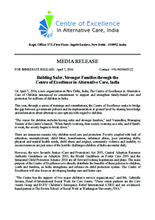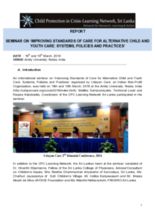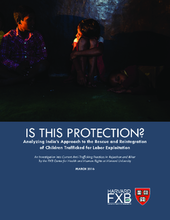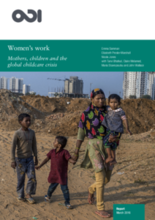childrens_living_arrangement
children_living_without_bio
Displaying 331 - 340 of 427
A Centre of Excellence in Alternative Care has just been launched in New Delhi, India, according to the article.
In this media release, the new The Centre of Excellence in Alternative Care of Children in India announces its launch and its commitment to support and strengthen family-based care and protection for millions of children in India.
This document reports on Udayan Care's international seminar on ‘Improving Standards of Care for Alternative Child and Youth Care: Systems, Policies and Practices’
Realizing the importance and need to improve standards of care, service delivery and mental health of institutionalized children, adolescents and young adults, Udayan Care announces its second biennial international conference on the the
Elisabet Purve-Jorendal was born in India and given away for adoption in 1973 when she was less than six months old. A Swedish couple adopted her when she was two-and-a-half years old. Forty-two years later, she tracked down her biological mother.
This report provides a comprehensive and critical analysis of the Indian government’s efforts to rescue and reintegrate children trafficked for their labor.
This report and summary explores the current childcare policy failures across a range of case-study countries, including Viet Nam, Gaza, Mexico, India and Ethiopia, and highlights examples of progress in countries which are successfully responding to these challenges.
This study examines whether parental migration can affect health and cognitive ability of left-behind children aged at 5-8 years old in Ethiopia, India, Peru, and Vietnam.
This study explores the association of caregiver and child characteristics with educational outcomes for orphaned and abandoned children (OAC) in India.
According to the Juvenile Justice Act for Kerala (a state in India), every police station in the state must have a special juvenile police unit or a child welfare officer (CWO).




